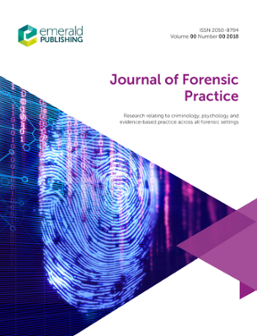The Journal of Forensic Practice: Volume 25 Issue 2
Research relating to criminology, psychology and evidence-based practice across all forensic settings
Table of contents
Factors influencing the assessment of witnesses in juridical contexts: a literature review. Legal, civil and psychological implications
Antonio Iudici, Miriam Stefano, Davide BinatoThis study aims to provide an overview of studies concerning bias in law, particularly in judges’ decisions. The authors intend to bring to light the factors that can most…
The Secure Quality Involvement (SeQuIn) tool: benchmarking co-production in secure services
Mick McKeown, Charlotte Byrne, Holly Cade, Jo Harris, Karen WrightSecure mental health services in one UK region have acted within a network to develop a range of involvement practices. A new quality benchmarking tool has been created to…
Transforming a specialist community service model for working with men with sexual convictions and personality difficulties
Jackie Craissati, Ophelia Phillips, Caitriona HigginsThe purpose of this discussion paper is to describe the transition over the past five years of a highly specialist group treatment programme to a tiered public health delivery…
There and back again: staff and service user perspectives on readmission to a secure mental health hospital
Maria Whittaker, Andy Cook, Marisa Marrocco, David OsborneReadmission to hospital can be distressing, costly for the National Health Service (NHS) and legally it should be a last resort as it entails restriction of liberty. This study…
“It’s the discharge and what comes after that” – a phenomenological analysis of peer support workers’ lived experiences of transitioning from psychiatric care
Kristina Brenisin, Mc Stephen Padilla, Kieran BreenTransition from inpatient mental health care to community living can be very difficult, as people are at an increased risk of suicide, self-harm and ultimately readmission into…
Challenges in determining whether youth with autism spectrum disorder have been sexually abused: implications for forensic interviewing
Meredyth Goldberg EdelsonThe purpose of this paper is to educate forensic interviewers about autism spectrum disorder (ASD) and tools for interviewing youth with ASD when there are concerns of child…
Brain science in American courts: the culpable neurotransmitters
Janet K. BrewerThe purpose of this paper is to analyse how novel homicide defences predicated on contemporary neuroscience align with legal insanity.

ISSN:
2050-8794Renamed from:
The British Journal of Forensic PracticeOnline date, start – end:
2013Copyright Holder:
Emerald Publishing LimitedOpen Access:
hybridEditors:
- Dr. Carol Ireland
- Dr Neil Gredecki